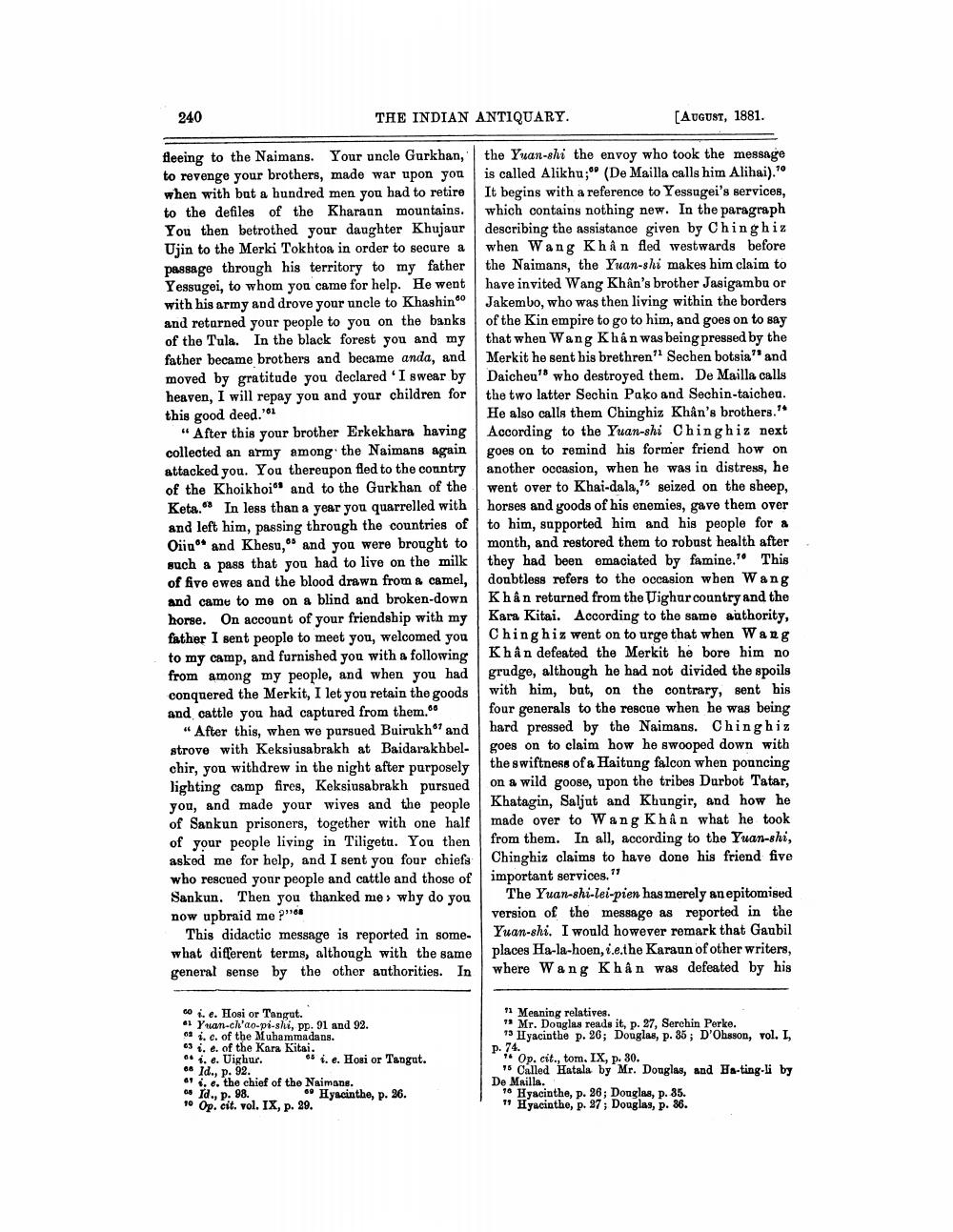________________
240
THE INDIAN ANTIQUARY.
[AUGUST, 1881.
fleeing to the Naimans. Your uncle Gurkhan, the Yuan-shi the envoy who took the message to revenge your brothers, made war upon you is called Alikhu;" (De Mailla calls him Alihai)." when with bat a hundred men you had to retire It begins with a reference to Yessagei's services, to the defiles of the Kharaan mountains. which contains nothing new. In the paragraph You then betrothed your daughter Khujaur describing the assistance given by Chinghiz Ujin to the Merki Tokhtoa in order to secure a when Wang Khân fled westwards before passage through his territory to my father the Naimans, the Yuan-shi makes him claim to Yessugei, to whom you came for help. He went have invited Wang Khan's brother Jasigambu or with his army and drove your uncle to Khashinoo Jakembo, who was then living within the borders and returned your people to you on the banks of the Kin empire to go to him, and goes on to say of the Tula. In the black forest you and my that when Wang Khán was being pressed by the father became brothers and became anda, and Merkit he sent his brethren" Sechen botsia" and moved by gratitude you declared 'I swear by Daicheu" who destroyed them. De Mailla calls heaven, I will repay you and your children for the two latter Sechin Pako and Sechin-taichea. this good deed.'1
He also calls them Chinghiz Khan's brothers." "After this your brother Erkekhara having According to the Yuan-shi Chinghiz next collected an army among the Naimans again goes on to remind his former friend how on attacked you. You thereupon fled to the country another occasion, when he was in distress, he of the Khoikhoi" and to the Gurkhan of the went over to Khai-dala," seized on the sheep, Keta." In less than a year you quarrelled with horses and goods of his enemies, gave them over and left him, passing through the countries of to him, supported him and his people for a Oiin" and Khesu, and you were brought to month, and restored them to robust health after such a pass that you had to live on the milk they had been emaciated by famine." This of five ewes and the blood drawn from & camel, doubtless refers to the occasion when Wang and came to me on a blind and broken-down Khân returned from the Uighur country and the horse. On account of your friendship with my Kara Kitai. According to the same authority, father I sent people to meet you, welcomed you Chinghiz went on to urge that when Warg to my camp, and furnished you with a following Khan defeated the Merkit he bore him no from among my people, and when you had grudge, although he had not divided the spoils conquered the Merkit, I let you retain the goods with him, but, on the contrary, sent his and cattle you had captured from them." four generals to the rescue when he was being
" After this, when we purgued Buirukh and hard pressed by the Naimans. Chinghiz strove with Keksiusabrakh at Baidarakhbel- goes on to claim how he swooped down with chir, you withdrew in the night after purposely
the swiftners of a Haitung falcon when pouncing lighting camp fires, Keksiusabrakh pursued on a wild goose, upon the tribes Darbot Tatar, you, and made your wives and the people Khatagin, Saljut and Khungir, and how he of Sankun prisoners, together with one half made over to Wang Khan what he took of your people living in Tiligetu. You then from them. In all, according to the Yuan-shi, asked me for help, and I sent you four chiefs Chinghiz claims to have done his friend five who rescued your people and cattle and those of important services." Sankun. Then you thanked me, why do you
The Yuan-shi-lei-pien has merely an epitomised now upbraid me?"
version of the message as reported in the This didactic message is reported in some- Yuan-shi. I would however remark that Gaubil what different terms, although with the same places Ha-la-hoen, i.e.the Karaun of other writers, general sense by the other anthorities. In where Wang Khan was defeated by his
p. 74.
60 i.e. Hosi or Tangut.
Yuan-cl'ao-pi-shi, pp. 91 and 92. 63 1. c. of the Muhammadans. 63 1. e. of the Kara Kitai. 6. i. e. Uighur.
1.e. Hosi or Tangat. en Id.. p. 92. 411, e. the chief of the Naimans. o d... 98.
Hyacinthe, p. 36. 10 Op. cit. vol. IX, p. 29.
11 Meaning relatives.
Mr. Douglas reads it, p. 27, Serehin Perke. 19 Hyacinthe p. 36; Douglas, p. 35; D'Ohsson, vol. I,
* Op. cit., tom. IX, p. 80. * Called Hatala by Mr. Douglas, and Ha-ting-li by De Mailla.
16 Hyacinthe, p. 26; Douglas, p. 35. + Hyacinthe, p. 27; Douglas, p. 86.




